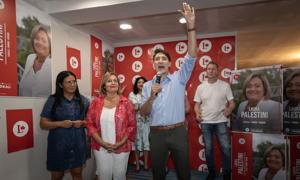
The loss in Quebec’s LaSalle-Emard-Verdun byelection appears to have had no effect on Prime Minister Justin Trudeau’s determination to continue, despite the latest Ipsos poll which shows his further drop in overall voter approval to 26 per cent, versus Pierre Poilievre’s rating of 45 per cent. This gap is widening despite Poilievre’s dangerous proposals, which include elimination of the carbon tax; a cap on immigration limits pending substantial housing increases; cancellation of CBC funding; and a crackdown on transgender rights. There is as well his previous support of the 2022 “Freedom Convoy’s” destructive Ottawa behaviour, and more recently his Trump-like “wacko” jargon both in Parliament and in his increasing public appearances.
Do the Liberals have an effective response to their declining public popularity? The Liberal Party has no applicable leadership review mechanism built into its constitution. There is a provision for a leadership endorsement ballot, which allows them to vote on whether they still support their leader. But this vote only can occur after the party loses a general election.

The party would have to amend its constitution to force a leadership review which could only take place at its next annual general meeting. That is not expected before 2025. With a year left in its minority government, subject to defeat at any time, an earlier AGM is virtually impossible.
Within hours of the byelection loss, Trudeau predictably repeated he has no intention of resigning and he will be the leader in the next election. Given the statements so far made by his cabinet colleagues, it appears there is no prospect they will request him to step down. The Bloc Québécois’ byelection victory poses a new danger.
Its leader, Yves-François Blanchet, questioned about the prospect of his party renewing the sovereignty movement, refused to say yes or no. Clearly this is a very troublesome possibility, and one which should emphasize the need for strong party leadership to uphold Trudeau’s father’s successful preservation of Canada. Despite these troublesome concerns, and assuming the unlikely possibility that the Liberal party takes timely action to achieve a new leader, who are the best prospects? Mark Carney is frequently mentioned, but given his recent appointment by Trudeau as chair of the “Taskforce on Economic Growth,” he is an unlikely candidate.
Granted, his training and performance as an economist and banker is exceptional, followed by his career as both governor of the Bank of Canada and governor of the Bank of England, and more recently head of impact investing at Brookfield Asset Management and chair of Bloomberg Inc. However, he lacks parliamentary experience, a crucial requirement in facing the debating skills of Poilievre. Another possibility is Dominic LeBlanc, an able federal parliamentarian, now holding the position of Minister of Public Safety, Democratic Institutions and Intergovernmental Affairs, following several previous important posts in the Trudeau cabinet.
However, he has regrettably suffered severe health problems since 2017. Although thankfully recovered, he has indicated repetitively that he does not wish to replace Trudeau. This, in my view, leaves one extremely able and strong alternative — Bob Rae, Canada’s Ambassador to the UN.
In addition to that top diplomatic position, he was recently internally elected as president of the UNs Economic and Social Council for a one-year term. However, I strongly believe that he would be the best replacement. I have written previously about his many positive accomplishments as Ontario’s premier in the 1990s, including successful promotion of the Jobs Ontario Program; supporting action on numerous Indigenous issues; increased investment on child care; training incentives for employers hiring people on welfare and workers whose employment insurance had run out, all resulting in the creation of over 50,000 new jobs.
By the end of the Rae government’s term, Ontario led the way in economic growth among the provinces and had one of the strongest economies in the G7. After he left the NDP, he joined the Liberal party and served as an elected member for five years — two of which as its interim Liberal leader. All options depend of course on Trudeau’s early departure from his position.
A hopeless expectation? Let’s hope not!.














